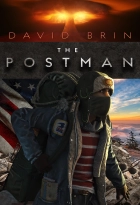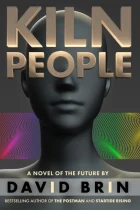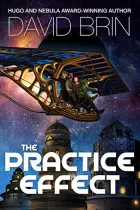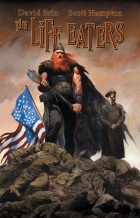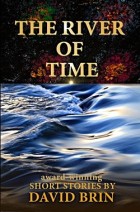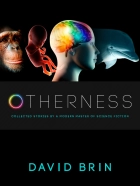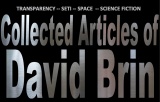A sampling of Science Fiction – or Speculative Fiction — authors on Twitter, many with interesting things to say about books, the craft of writing, SF news, as well as science and the future.
In alphabetic order (compiled by Anonymous), the brief descriptions and selected works don’t begin to do justice to these fantastic authors. Yes, the list veers toward the SF end of SFF, with emphasis on writers of novels, rather than short stories. Apologies for the those who have been inadvertently left off. And many well-known authors, Connie Willis or Kim Stanley Robinson, don’t have accounts (probably because they’re busy writing)…
Daniel Abraham, Best-selling author and producer, half of the James S.A. Corey team (The Expanse, Leviathan Wakes) @AbrahamHanover
John Joseph Adams, editor of Science Fiction anthologies (Best American Science Fiction and Fantasy, Brave New Worlds) @JohnJosephAdams
Saladin Ahmed, Locus Award winning author (Throne of the Crescent Moon, Engraved on the Eye) @saladinahmed
 Buzz Aldrin, Astronaut, Lunar Module pilot and moonwalker, as well as a SF author, collaborating with John Barnes (Encounter with Tiber, The Return) @TheRealBuzz
Buzz Aldrin, Astronaut, Lunar Module pilot and moonwalker, as well as a SF author, collaborating with John Barnes (Encounter with Tiber, The Return) @TheRealBuzz
Charlie Jane Anders, Founding editor of io9, short story writer and award-winning Science Fiction author (All the Birds in the Sky) @charliejane
Lou Anders, Science Fiction author and Hugo Award winning editor (Frostborn, Nightborn) @LouAnders
Kevin J. Anderson, Best-selling Science Fiction author (The Sisterhood of Dune, Hellhole) @TheKJA
Lou Aronica, Science Fiction author, editor and publisher (Blue, Differential Equations) @laronica
Catherine Asaro, Nebula Award winning Science Fiction and Fantasy author (Saga of the Skolian Empire, The Quantum Rose) @Catherine_Asaro
Madeline Ashby, Science Fiction author and consultant (Company Town, iD) @MadelineAshby
Neal Asher, English Science Fiction author (The Departure, Zero Point) @nealasher
Margaret E. Atwood, Booker Prize, Arthur C. Clarke Award winning author and poet (The Handmaid’s Tale, Oryx and Crake) @MargaretAtwood
Paolo Bacigalupi, Locus, Hugo and Nebula Award wining Science Fiction author (The Windup Girl, The Water Knife) @paolobacigalupi
John Barnes, Science Fiction and YA author (Tales of the Madman Underground, Meeting Infinity) @JohnBarnesSF
Steven Barnes, Science Fiction author and frequent collaborator with Niven and Pournelle (Beowulf’s Children, Lion’s Blood) @StevenBarnes1
Elizabeth Bear, Hugo and John W. Campbell Award winning Science Fiction author (Hammered, Blood and Iron) @matociquala
Greg Bear, Nebula, Locus and Hugo Award winning Science Fiction author (Darwin’s Radio, Queen of Angels) @greg_bear
Chris Beckett, Arthur C. Clarke Award winning Science fiction author (Dark Eden, The Holy Machine) @chriszbeckett
Lauren Beukes, South African SF author, comics writer and journalist (Broken Monsters, The Shining Girls) @laurenbeukes
Aliette de Bodard, Software engineer, Nebula and Locus Award winning Science Fiction and Fantasy author (House of Shattered Wings, In Morningstar’s Shadow) @aliettedb
Ben Bova, Six time winner of the Hugo Award; Science Fiction and non-fiction author and Editor (Grand Tour series, The Science Fiction Hall of Fame) @BenBova
David Brin, Hugo, Nebula, Locus and Campbell Award winning Science Fiction author (Startide Rising, The Postman) @davidbrin
Tobias S. Buckell, Science Fiction author (Sly Mongoose, Halo: The Cole Protocol) @tobiasbuckell
Emma Bull, Science Fiction and Fantasy author (Falcon, Bone Dance) @coffeeem
Monica Byrne, Upcoming Science Fiction author and playwright (The Girl in the Road) @monicabyrne13
Pat Cadigan, Arthur C. Clarke Award winning Science Fiction author (Synners, Fools) @Cadigan
Christian Cantrell, Software developer and Science Fiction author (Containment, Equinox) @cantrell
Orson Scott Card, Hugo and Nebula Award wining Science Fiction author (Ender’s Game, Speaker for the Dead) @orsonscottcard
Jeff Carlson, Science Fiction and thriller author (Plague Year, Plague War) @authorjcarlson
Adam-Troy Castro, Science Fiction, Fantasy and YA author (Tangled Strings, Emissaries from the Dead) @adamtroycastro
Becky Chambers Science Fiction author (The Long Way to a Small, Angry Planet, A Closed & Common Orbit) @beckysaysawr
C.J. Cherryh, Hugo and Locus Award winning Science Fiction and Fantasy author (Cyteen, The Pride of Chanur) account no longer exists
Wesley Chu, John W. Campbell Award winning Science Fiction author (Time Salvager, Time Siege) @wes_chu
Liu Cixin , Chinese Science Fiction author, winner of the Hugo Award and the Galaxy Award (The Three Body Problem, The Dark Forest) @liu_cixin
Ernest Cline, Best-selling author and screenwriter (Ready Player One, Armada) @erniecline
Peter Clines, Science Fiction and horror author (The Fold, 14) @PeterClines
August Cole, Senior Fellow at the Brent Scowcroft Center, director of The Art of the Future (Ghost Fleet: A Novel of the Next World War, War Stories from the Future (ed.)) @august_cole
Eoin Colfer, Young adult Science Fiction and Fantasy author (Artemis Fowl, The Supernatualist) @eoincolfer
Brenda Cooper, Science Fiction author (The Silver Ship and the Sea, Wings of Creation) @brendacooper
James S.A. Corey, New York Times best-selling pseudonym (The Expanse, Nemesis Games) @JamesSACorey
Paul Cornell, Award-winning author and screenwriter for Doctor Who (The Severed Streets, Who Killed Sherlock Holmes) @Paul_Cornell
Bruce Coville, author of Young Adult fiction (My Teacher Is An Alien, Aliens Ate My Homework) @brucecoville
Katherine Cramer, Science Fiction author and editor (The Hard SF Renaissance, The Year’s Best SF Series) @KathrynECramer
Justin Cronin, New York Times best-selling author, winner of the PEN/Hemingway Award (The Passage, The Twelve) @jccronin
Julie Czernada, Science Fiction and Fantasy author and editor (This Gulf of Time and Stars, No Place Like Home) @julieczernada
Jack Dann Award-winning Science Fiction and Historical fiction author (The Memory Cathedral, The Silent) @jackmdann
Ellen Datlow, Hugo Award winning Science Fiction and Horror editor (The Best Horror of the Year, Year’s Best Fantasy and Horror) @EllenDatlow
Cory Doctorow, John W. Campbell and Locus Award winning Science Fiction author (Little Brother, Makers) @doctorow
Diane Duane, Young adult and Science Fiction and Fantasy author (So You Want to Be a Wizard, Wizard’s Dilemma, plus many Star Trek novels) @dduane
Tananarive Due, Science Fiction, fantasy and mystery author, screenwriter and producer (Ghost Summer, The Lake ) @TananariveDue
Scott Edelman, Science Fiction, Fantasy and Horror author and editor (What Will Come After, What We Still Talk About) @scottedelman
Amal El-Mohtar Hugo, Nebula, Locus award winning author (The Djinn Falls in Love and Other Stories) @tithenai
Kate Elliott, Fantasy and Science Fiction author (The Crown of Stars, Cold Steel) @KateElliottSFF
Eric Flint, Science Fiction author and editor. Writer of alternate histories. (1632, 1636: The Saxon Uprising) @EricFlint
Gregory Frost, Fantasy and Science Fiction (Lyrec, Shadowbridge) @gregory_frost
Neil Gaiman, Locus, Hugo and Nebula Award winning Science Fiction Author (American Gods, Coraline). Also Graphic Novels (The Sandman) @neilhimself
Charles E. Gannon, Professor and Best-selling and Nebula nominated author (Fire with Fire, Raising Caine) @cegannon1
David Gerrold, Hugo and Nebula Award winning Science Fiction author and screenwriter (The Man Who Folded Himself, The Martian Child) @DavidGerrold
William Gibson, Hugo, Nebula and Philip K. Dick Award winning Science Fiction and Cyberpunk author (Neuromancer, Mona Lisa Overdrive) @GreatDismal
Max Gladstone, Science Fiction/Fantasy author (Full Fathom Five, Last First Snow) @maxgladstone
Kathleen Goonan, John W. Campbell Award winning Science Fiction author (In War Times, This Shared Dream) @KathleenGoonan
Steven Gould, New York Times best-selling Science Fiction author and short story writer (Jumper, Reflex) @StevenGould
Daryl Gregory, Science Fiction and Fantasy author (Afterparty, Harrison Squared) @darylwriterguy
Nicola Griffith, Nebula and James Tiptree Award winning Science Fiction and Fantasy author and editor (Ammonite, With Her Body) @nicolaz
Lev Grossman, John W. Campbell Award winning Fantasy and Young Adult author (The Magicians, The Magician King) @leverus
Eileen Gunn, Nebula Award winning Science Fiction author and editor (Stable Strategies and Others, The Wiscon Chronicles) @eileen_gunn
Elizabeth Hand, Nebula and World Fantasy Award winning Science Fiction and Fantasy author (Walking the Moon, Winterlong) @Liz_Hand
William Hertling, Science Fiction author (Avogadro Corp., A.I. Apocalypse) @hertling
Nancy Holder, Bram Stoker Award wining Science Fiction and Horror Author (Pretty Little Devils, Wicked: Revelation), as well as works in the Buffyverse @nancyholder
Nalo Hopkinson, Aurora and Locus Award winning Fantasy and Science Fiction author (The New Moon’s Arms, So Long Been Dreaming) @nalohopkinson
Jason M. Hough, Best-selling author (The Darwin Elevator, Zero World) @JasonMHough
Hugh Howey, Best-selling Science Fiction author (Wool, Sand) @hughhowey
Meg Howrey, author of nonfiction and science fiction (The Wanderers, Blind Sight) @MegHowrey
N.K. Jemison, Locus Award winning author, Hugo nominee and short story writer (The Hundred Thousand Kingdoms, The Killing Moon) @nkjemisin
Guy Gavriel Kay, Canadian author, poet, and producer (River of Stars, Children of Earth and Sky) @guygavrielkay
Kay Kenyon, Science Fiction and Fantasy author (Maximum Ice, The Braided World) @KayKenyon
T. Jackson King, Science Fiction Author and reporter (Stellar Assassin, Escape from Aliens) @TJacksonKing
Dani Kollin, Prometheus Award winning Science Fiction author, with brother Eytan Kollin (The Unincorporated Man, The Unincorporated Woman) @dkollin
Ted Kosmatka, Science Fiction writer (The Flicker Men, The Games) @TKosmatka
Mary Robinette Kowal, John W. Campbell Award winning Author and puppeteer (Shades of Milk and Honey, Forest of Memory) @MaryRobinette
Nancy Kress, Hugo and Nebula Award winning Science Fiction author (Beggars in Spain, Probability Space) @nancykress
Mur Lafferty, Campbell Award and Parsec winning author and podcaster (Six Wakes, Playing for Keeps) @mightymur
Margo Lanagan, World Fantasy Award winning author (Yellowcake, Tender Morsels ) @margolanagan
Ann Leckie, Hugo and Nebula Award winning author (Ancillary Justice, Ancillary Mercy) @ann_leckie
Ursula K. Le Guin, Booker Prize, Hugo, Nebula, Locus Award winning science fiction and fantasy author (The Left Hand of Darkness, Lavinia) @ursulaleguin
Paul Levinson, Locus Award winning Science Fiction author (Silk Code, The Plot to Save Socrates) @PaulLev
Jacqueline Lichtenberg, Science Fiction author (Hero, To Kiss or To Kill) @JLichtenberg
Charles de Lint, Fantasy and Horror author (The Onion Girl, Widdershins) @cdelint
Ken Liu, Hugo, Nebula and World Fantasy award winning author and translator (Grace of Kings, The Paper Menagerie and Other Stories) @kyliu99
Ian McDonald, British Science Fiction author , winner of the Hugo, Locus, Philip K. Dick and John W. Campbell awards (Luna: New Moon, The Dervish House) @ianmcdonald
Seanan McGuire, John W. Campbell Award winning science fiction author, who also writes under the name Mira Grant (Feed, Symbiont) @seananmcguire
Maureen McHugh, Hugo, Locus and James Tiptree Jr. Award winning Science Fiction and Fantasy author (China Mountain Zhang, Half the Day is Night) @maureenmcq
Will McIntosh, Hugo Award winning Science Fiction and YA author (Burning Midnight, Soft Apocalypse) @WillMcIntoshSF
Vonda N. McIntyre, Hugo and Nebula Award winning Science Fiction author (Dreamsnake, The Moon and the Sun), also many novels in the Star Trek Universe @vondanmcintyre
Ken MacLeod, Scottish Science Fiction author (The Stone Canal, The Sky Road) @amendlocke
George R. R. Martin, Best-selling Hugo and Nebula Award winning Fantasy, Science Fiction and Horror author (Game of Thrones, A Dance with Dragons) @GeorgeRRMartin
Elizabeth Moon, Nebula and Robert A. Heinlein Award winning Science Fiction and Fantasy author (The Speed of Dark, Kings of the North) @emoontx
Richard K. Morgan, Science Fiction and Fantasy novelist (Altered Carbon, Thirteen) @quellist1
James Morrow, Award winning Science Fiction author (Towing Jehovah, Galapagos Regained( @jimmorrow11
Ramez Naam, Tehnologist, public speaker and author of nonfiction as well as Philip K. Dick and Prometheus Award winning Science Fiction (Nexus, Apex, Crux) @ramez
Linda Nagata, Nebula and Locus Award winning Science Fiction author (Vast, Memory) @LindaNagata
Annalee Newitz, founder of io9, tech editor at Ars Technica, non-fiction author (Scatter, Autonomous) @Annaleen
Emma Newman, Author of urban fantasy and science fiction (Planetfall, After Atlas) @EmApocalyptic
Garth Nix, Australian fantasy and YA novelist (Shade’s Children, To Hold the Bridge) @garthnix
Naomi Novik, Hugo and John W. Campbell Award winning author of alternate history (Crucible of Gold, Tongues of Serpents) @naominovik
Nnedi Okorafor, Professor of creative writing and Hugo Award winning author (The Book of Phoenix, Lagoon) @Nnedi
Daniel José Older, Author of urban fantasy and young adult novels (Shadowshaper, Bone Street Rumba) @djolder
Malka Older, Science Fiction and thriller author (Infomocracy, Null States) @m_older
Peter Orullian, writer of epic fantasy (Trial of Intentions, The Unremembered) @PeterOrullian
Ada Palmer, Historian, author of science fiction & fantasy (Too Like the Lightning, Seven Surrenders) @Ada_Palmer
Eliot Peper, editor, writer of science fiction thrillers (Cumulus, Neon Fever Dream) @eliotpeper
Gareth L. Powell, Winner of the BSFA Award for best novel (Ack-Ack Macaque, The Recollection) @garethlpowell
Sir Terry Pratchett may be the greatest writer of fantasy and comedy, winner of the World Fantasy Award for Life Achievement, now deceased (The Colour of Magic, The Light Fantastic) @terryandrob
Tim Pratt, Hugo Award winning Science Fiction and Fantasy author (Spell Games, Dead Reign) @timpratt
Cherie Priest, Locus Award winning Science Fiction and Horror author (Boneshaker, Fatham) @cmpriest
Hannu Rajaniemi, Locus and John W. Campbell Award winning Science Fiction author and mathematician (The Fractal Prince, The Causal Angel) @hannu
Cat Rambo, Fantasy and Science Fiction author and editor (Eyes Like Sky and Coal and Moonlight) @catrambo
Marguerite Reed, Philip K. Dick Special Citation award winning author (Archangel) @MargueriteReed9
Mike Resnick, Multiple Hugo and Locus Award winning Science Fiction author (Starship: Mutiny, Santiago) @ResnickMike
Alastair Reynolds, Former ESA scientist, Science Fiction author (The Medusa Chronicles, Blue Remembered Earth) @AquilaRift
Rudy Rucker, Philip K. Dick Award winning Science Fiction author and mathematician (Software, Realware) @rudytheelder
Kristine Kathryn Rusch, Hugo Award winning Science Fiction and Fantasy author and editor (Hitler’s Angel, Totally Spellbound) , as well as works in the Star Trek universe @KristineRusch
Geoff Ryman, Professor of writing, author of Science Fiction, fantasy and historic novels (Was, The Unconquered Country) @geoffryman
Brandon Sanderson, Science Fiction, fantasy and author (Calamity, Firefight) @BrandSanderson
Robert J. Sawyer, Hugo, Nebula and John W. Campbell Award winning Science Fiction author (Rollback, Flashforward) @RobertJSawyer
John Scalzi, John W. Campbell and Hugo Award winning author (Fuzzy Nation, Old Man’s War) @scalzi
Lawrence M. Schoen, Award-winning author (Barsk: The Elephant’s Graveyard, Buffalito Destiny) @klingonguy
Karl Schroeder, Aurora Award winning Science Fiction author (Permanence, The Sunless Countries) @KarlSchroeder
Nisi Shawl, award-winning author of SFF and alternate history (EverFair, Something More and More) @NisiShawl
Scott Sigler, Parsec Award winning Science Fiction and Horror author (Infected, Contagious) @scottsigler
Dean Wesley Smith, Science Fiction author (Laying the Music to Rest, The Hunted) @DeanWesleySmith
Michael Stackpole, Science Fiction and Fantasy author and Game Designer (I, Jedi, Evil Trimphant) @MikeStackpole
Bruce Sterling, Hugo and Campbell Award winning Science Fiction and Cyberpunk author (Distraction, The Caryatids) @bruces
Neal Stephenson, Hugo, Locus and Prometheus Award winning Science Fiction author (Quicksilver, The Diamond Age) @nealstephenson
Charles Stross, Locus and Hugo Award winning Science Fiction author (Halting State, Rule 34) @cstross
Daniel Suarez, New York Times best-selling author of high-tech, science fiction thrillers (Change Agent, Daemon) @itsDanielSuarez
Tom Sweterlitsch author of science fiction thrillers (The Gone World, Tomorrow and Tomorrow) @LetterSwitch
Rachel Swirsky, Nebula Award winning short story writer (How the World Became Quiet, A Memory of Wind) @rachelswirsky
Lavie Tidhar, Seiun Award and World Fantasy Award winning author (Central Station, A Man Lies Dreaming) @lavietidhar
Ian Tregillis, Physicist and Science Fiction author (The Rising, The Mechanical) @ITregillis
Hayden Trenholm, Science Fiction and mystery writer ( Blood & Water, Strangers Among Us) @HaydenTrenholm
Harry Turtledove, Writer of alternate history, fantasy and science fiction (Guns of the South, How Few Remain ) @HNTurtledove
Catherynne Valente, James Tiptree, Andre Norton award winning SF and Fantasy author (Space Opera, Radiance) @catvalente
Jeff VanderMeer, Fantasy and Science Fiction author (Finch, Annihilation) @jeffvandermeer
Andy Weir, Best-selling Science Fiction author (The Martian, Artemis) @andyweirauthor
Scott Westerfeld, Young adult and Science Fiction author (Leviathon, Uglies) @ScottWesterfeld
Fran Wilde, Andre Norton Award winning Science fiction and fantasy author (Updraft, Cloudbound) @fran_wilde
Daniel H. Wilson, Roboticist and New York Times best-selling author (Robopocalypse, Robogenesis) @danielwilsonpdx
G. Willow Wilson, World Fantasy Award winning and Graphic Novel author (Alif the Unseen, The Butterfly Mosque) @GWillowWilson
Gary K.Wolfe, Science Fiction editor and critic @garykwolfe
Alyssa Wong, Nebula Award winning author of science fiction and horror (A Fist of Permutations and Wildflowers ) @crashwong
Charles Yu, Science Fiction novelist and short story writer (How to Live Safely in a Science Fictional Universe, Third Class Superhero) @charles_yu
Liz Ziemska, Literary agent and SFF author (Mandelbrot the Magnificent) @Ziemska
Leni Zumas, Science fiction author and professor (Red Clocks, The Listeners) @lenizumas
Other Science Fiction sites:
SFX Magazine, Sci Fi and Fantasy Magazine @SFXmagazine
StarShipSofa Podcast of Science Fiction stories @StarShipSofa
Locus Magazine, Science Fiction and Fantasy News @LocusChat
SF Signal, a Science Fiction blog @sfsignal
The Hugo Awards, News on the Hugos @TheHugoAwards
io9, Commentary and updates on Science, Science Fiction and Media @io9
SFWA Authors, Blog posts from members of the Science Fiction and Fantasy Writers of America @SFWAauthors
Clarkesworld, Online Science Fiction Magazine @clarkesworld
Tor Books, Science Fiction and Fantasy News @torbooks
Baen Books, Science Fiction and Fantasy Publishing @BaenBooks
Ace Science Fiction, Science Fiction and Fantasy Publishing @AceRocBooks
Museum of Science Fiction, to open in Washington DC @Museum_SciFi
Hollywood Science Fiction Museum, to open in Hollywood, @hollywoodscifi
Novum Future, Science fiction news and podcast, @NovumPodcast
Fantasy Faction, Fantasy Book Reviews @FantasyFaction
B&N SF & F, Barnes & Noble Science Fiction & Fantasy @BNSciFi
SF Encyclopedia, Updates from the Encyclopedia of Science Fiction @SFEncyclopedia
SF Editor’s Picks, editor’s Science Fiction recommendations @SFEditorsPicks


 In coming years the screenplay, as such, may become obsolete, both to sell an idea for filming and as a working production tool. Instead, a small team consisting of the writer, a computer-animator, a photographic specialist, a musical specialist and some voice actors might team up before hitting the studios with a pitch. Using animatics and integration technologies that already exist, such a team might create a complete 90 minute cinematic story wherein animated characters act and speak upon sets that are computer-merged from still-photos or video pans.
In coming years the screenplay, as such, may become obsolete, both to sell an idea for filming and as a working production tool. Instead, a small team consisting of the writer, a computer-animator, a photographic specialist, a musical specialist and some voice actors might team up before hitting the studios with a pitch. Using animatics and integration technologies that already exist, such a team might create a complete 90 minute cinematic story wherein animated characters act and speak upon sets that are computer-merged from still-photos or video pans.






 Whether you’re a science fiction pro, a teacher or occasional reader, these websites offer a wealth of background, history and insight into the genre, ranging from timelines of the future to lists of great books, from literature maps to compilations of spaceships, as well as sites that help with writing and world-building. Plus links to science fiction podcasts, SF publishers, fanzines, online magazines and more.
Whether you’re a science fiction pro, a teacher or occasional reader, these websites offer a wealth of background, history and insight into the genre, ranging from timelines of the future to lists of great books, from literature maps to compilations of spaceships, as well as sites that help with writing and world-building. Plus links to science fiction podcasts, SF publishers, fanzines, online magazines and more.



 Atomic Rockets:
Atomic Rockets:
 Sci Fi World Generator:
Sci Fi World Generator:







 Buzz Aldrin, Astronaut, Lunar Module pilot and moonwalker, as well as a SF author, collaborating with John Barnes (Encounter with Tiber, The Return)
Buzz Aldrin, Astronaut, Lunar Module pilot and moonwalker, as well as a SF author, collaborating with John Barnes (Encounter with Tiber, The Return) 


































